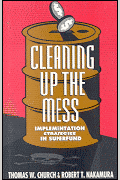In the United States and throughout the world, there is a growing consensus on the need for clean energy technology and greater energy efficiency. National security concerns about overreliance on foreign oil, climate change concerns, and the finite nature of fossil fuels all increase interest in expanding the capabilities of the clean economy.
Yet, many firms in the clean economy have trouble accessing the capital needed to grow. Companies interested in bringing new clean energy and energy-efficiency technologies to the marketplace face a particular obstacle known as the ominous-sounding “deployment valley of death.” Because these technologies are not yet widely used, they require significant capital investment in order to take projects to scale. But private capital firms have proven reluctant to provide this capital because of concerns about uncertain demand, long cost curves, and other factors.
Connecticut has come up with what they hope will be a solution to this dilemma in the creation of a state green bank. Established in June 2011 with bipartisan support, the Clean Energy Finance and Investment Authority (CEFIA) is designed to provide low-cost financing to promising clean energy and energy efficiency projects. By consolidating and repurposing existing state funds into a quasi-public finance authority, CEFIA leverages limited state resources for maximum effect in an attempt to place no additional burden on state taxpayers or utilities users.
As the nation’s first fully funded green bank, CEFIA aims to spark growth in Connecticut’s clean economy sector by providing low-cost capital for clean energy and energy efficiency deployment projects. “This is a model that is going to do much more to drive innovation,” says Dan Esty, commissioner of the Connecticut Department of Energy & Environmental Protection. “Our hope is to turn Connecticut into the leader on clean energy in the country.”
In addition to the environmental benefits of cleaner and more efficient energy use, CEFIA also has the potential to strengthen the state’s economy. “Connecticut has demonstrated that it is serious about putting people to work and lowering the cost of essential services for its residents,” says Reed Hundt, CEO of Coalition for Green Capital, a D.C.-based nonprofit. “This legislation will serve as a model for the nation.”






Commentary
Connecticut Looks to Jumpstart Its Clean Economy
January 18, 2012